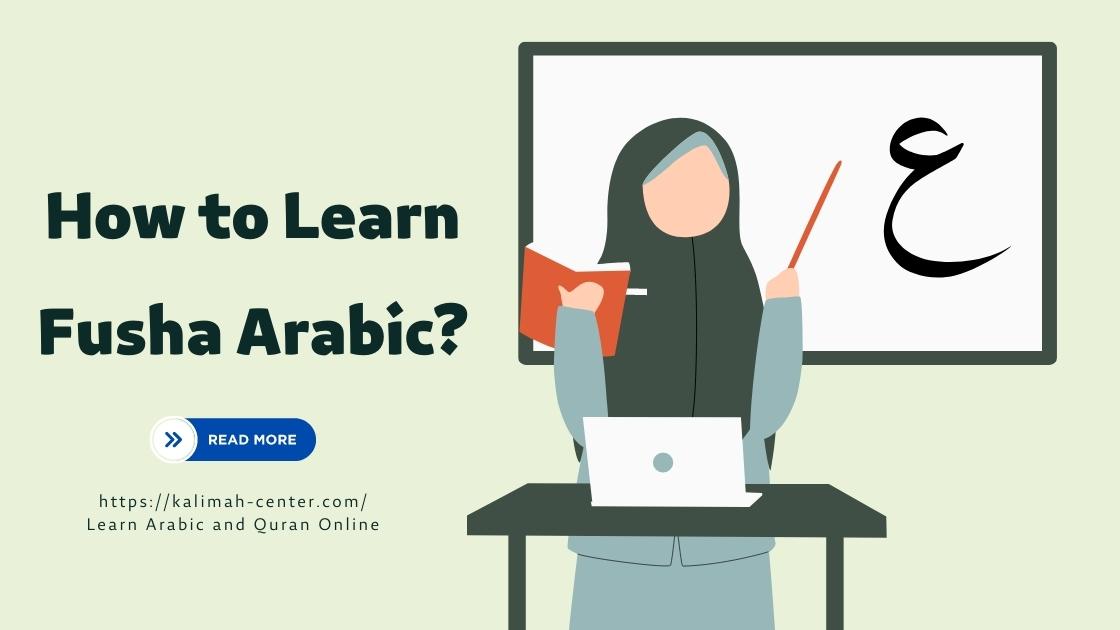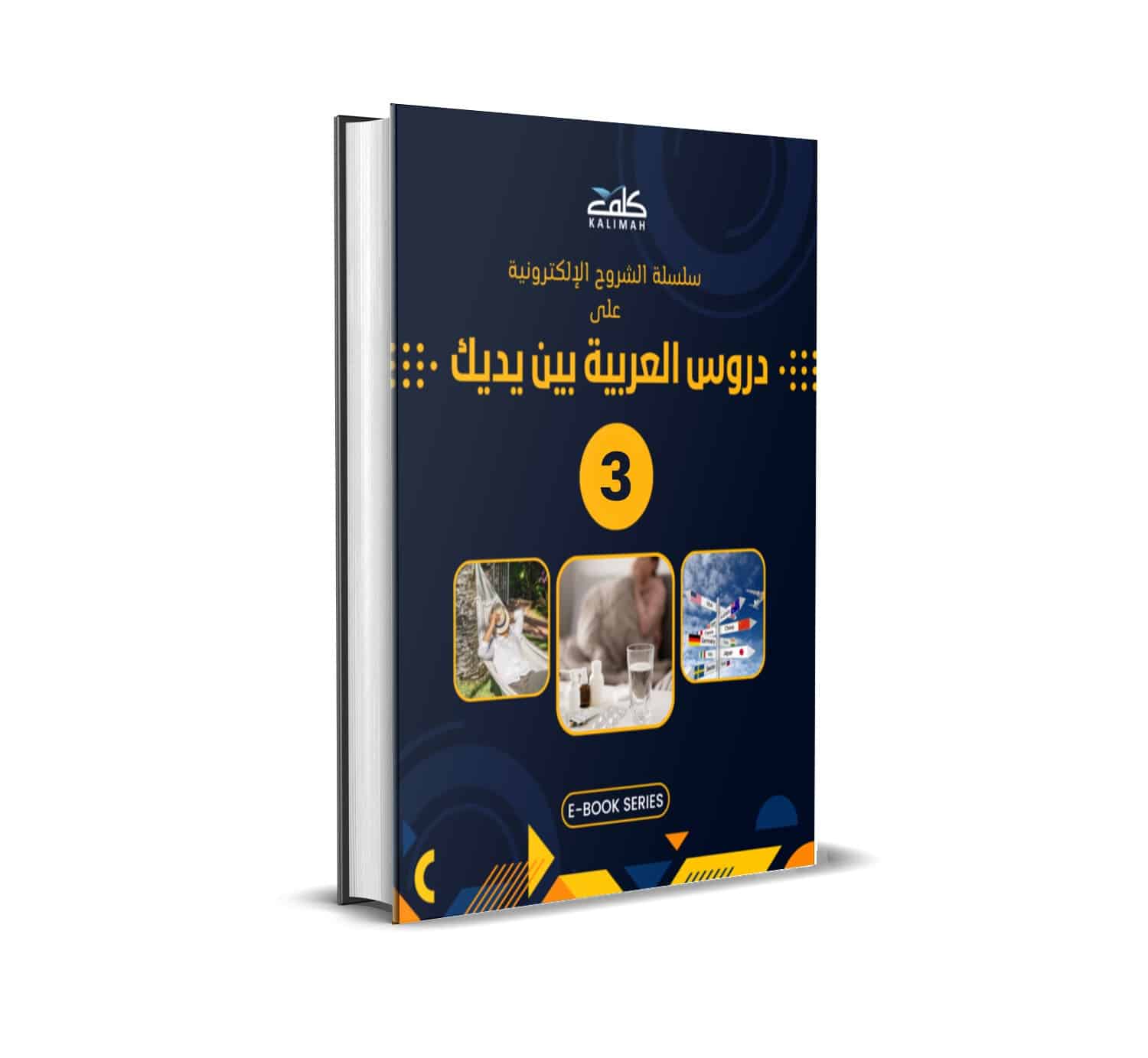In a nutshell: Arabic, while universally accessible in prayer and communication, holds Fusha Arabic in special esteem due to its eloquence and role in formal contexts. Though Modern Standard Arabic (MSA) and Fusha are essentially the same, Fusha’s sophisticated form enriches religious and literary texts, making it the ideal choice for a deep and nuanced understanding of the language.
Although Allah would hear the pleas of believers in any language, and all languages are created by Allah Almighty, the Arabic language has a very distinguished status amongst other languages in Islam. You can easily learn Fusha Arabic nowadays.
This is because fundamental religious deeds such as praying will undoubtedly need some knowledge of the Arabic language. But then again, we are faced with a question: which Arabic language?
We hear of many versions of the Arabic language, and each of them is an independent entity, with some common features with the other Arabic dialects.
We have MSA (Modern Standard Arabic), Fusha Arabic, Egyptian dialect, Libyan dialect, Saudi Dialect, Palestinian dialect, Algerian dialect, and the list goes on and on…
What Is Fusha Arabic?
Fusha Arabic is basically the standard sophisticated Arabic language that is used in formal occasions, official occasions, and prestigiously authoritative occasions.
It’s the language that was spoken during the Pre-Islamic period when language sophistication and language aesthetics was highlighted in their distinguished composition of poetry, and it’s currently the official language of many Arabic countries.
The Arabic language’s successful survival for centuries and millennia shows its alive soul, which is adaptable to when and where it is spoken; when one compares Pre-Islamic Arabic with the current standard Arabic, it has shifted and changed a lot.
To further understand what Fusha Arabic is, we need to know what it is like, and what it is not like.
Is The Quran Fusha Arabic?
Being a language of aestheticism, sophistication, and richness in meaning, the Quran is written in Fusha Arabic.
Though, being the words of Allah, there is nothing written in the same style, or will ever be written in even a similar style.
We as human beings acquire what are already existent languages and use them to convey messages, but Allah is the one who created language in the first place; thus, his words must have no similarities and no alike.
It’s from the Quran, Allah’s words, that Arabic linguists derived the grammar of standard Arabic.
What Is The Linguistic Properties Of Fusha Arabic?
The researchers used the ancient and modern characteristics of the Arabic language, some considered that the features characterized by the Arabic language than other languages. And some considered them as features and descriptions dominated the Arabic language more than dominated the other languages. Some considered it to be an Arabic feature in which other languages shared the same degree.
The Arabic language was distinguished by its unique features and characteristics from other languages in the historical, religious and cultural aspects, as well as the linguistic aspects of the voices and disposition, and the meaning and eloquence. It is described in the descriptions and attributes that I have overcome and known, although these features or some of them in other languages to varying degrees.
What Is The Grammar In Arabic Fusha (The Part Of Adjectives) In Arabic Fusha?
Learning the Arabic Adjectives is very important because its structure is used in every day conversation. The more you master it the more you get closer to mastering the Arabic language. But first we need to know what the role of Adjectives is in the structure of the grammar in Arabic.
Arabic Adjectives are words that describe or modify another person or thing in the sentence.
In Arabic adjectives are of the form فعيل Fa3iil like كبير kabiir big, صغير saghriir small. One rule is that if a noun is definite the adjective has to be definite. Like in البيت الكبير Al-bait Al-kabir The house the big (Al is the Arabic indefinite article).
The Arabic most common adjectives اِسْمَُ صِفَةٍ are of the forms:
- Faa3l(un) فَاعِلٌ which actually is the active participle of Fa3aLa فَعَلَ.
- Fa3iel(un) فَعِيلٌ which I think is the most common
- Fa3uul(un) فَعُولٌ
- Fa3Laan(u) فَعْلانُ
Some adjectives use the form Fa3Laan(u) فَعْلانُ, for example Ar-radjulun Az-Za3aLaanu الرَّجُلُ الزَّعَلانُ, the angry man.
The form Fa3uuL(un) فَعُولٌ is an adjective denoting intensity. Ana KaSuuL(un), for example means I am very lazy, from the stative verb KaSiLa كَسِلَ to be lazy.
The plural masculine of this form Fa3iel(un) فَعِيلٌ is Fi3aaL(un) فِعَالٌ for the masculine nouns and Fu3Laa’u فُعْلاءُ (diptote) for the feminine.
Adjectives of Occupation
An other form of adjectives is Fa33aaL(un) فَعَّالٌ, they are mostly used to describe occupations like GuBBaaZ(un) خَبَّازٌ bake
Colors and defects
Then there is a special adjective used for colors and defects, these have a masculine and feminine form aF3aL(u) افْعَلُ masculine and F3aLaa’u فَعْلاءُ feminine.
How To Learn Fusha Arabic?
Languages are a tricky field of knowledge to learn; because, unlike all other fields of knowledge, it’s not about learning some information, but about training your brain to become bilingual or multilingual which is neither easy nor simple.
Bear in mind that languages are the field of knowledge that permit us, human beings, to communicate and share all other fields of knowledge.
Kalimah Center offers different educational packages and courses of different levels, which allows you the opportunity to choose what suits you best.
The courses at Kalimah Center are online, which will help you save a lot of time and effort in learning Fusha Arabic or MSA.
How To Learn (Master) Fusha Arabic Online And What Is The Best Fusha Arabic Course?
Fusha Arabic is one of the most common world languages. This major form of the Arabic language is the form used in literature, media, and official settings in the Arab world.
Besides linguistic factors, learning Fusha Arabic will be the perfect choice to broaden your cultural horizons. You can now learn Fusha Arabic efficiently with Riwaq Al Quran! We aim to help you learn Arabic Fusha online in an easy way.
Learn Fusha Arabic Online with Native Arabs is designed to provide a unique and engaging learning experience. Led by native-speaking instructors from Al-Azhar Al-Sharif, we offer a structured program that helps to build a strong foundation in Fusha Arabic (Listening, Reading, Writing, and Speaking).
What Does The Student Expect from this Modern Standard Arabic Course?
This Fusha Arabic online course focuses on modern standard Arabic. It is designed to take you on a learning journey from the modern standard Arabic basics to the high level of speaking, listening, writing, and reading Modern Standard Arabic efficiently and professionally. We offer engaging Fusha Arabic lessons that will amaze you.
After this Modern Standard Arabic, you may expect to be able to do the following:
Read and comprehend modern Arabic books efficiently and professionally; Be able to use the learning tools required to develop your MSA Arabic in the Future;
Have a good understanding of variant modern Arabic structures and how to extend your learning.
Tips That Will Make Learning Arabic A Lot Easier Than Expected:
To make learning Arabic easier, focus on regular reading, consistent practice with native speakers, and structured language courses. Stay patient, maintain a routine, and remember that mastering Fusha Arabic is a gradual process requiring time and dedication.
1- Reading is your magic wand:
Generally, reading helps students in acquiring languages faster and with ease; as it will keep feeding your dictionary, and will keep the language alive in your brain.
2- Practice is key:
Remember how we explained earlier that language acquisition is different from learning any other field of knowledge?! Well, the solution to taming the monster languages can be practicing.
Make a new friend, whose native language is your targeted language, and ask them to help you in your journey.
3- Language courses are the safe way out of the woods:
Although learning a language on one’s own isn’t impossible, it usually exposes one to embarrassment when they make a mistake in front of a native.
And trust me, you will make mistakes on your own; so, take the shortcut and join a course; such as the professional Arabic courses at Kalimah Center.
4- Don’t lose your fired-up spirit:
Be aware that it’s not a one-day trip, but a several-month journey, that can be time-consuming, and exhausting. But, it will definitely be fruitful and bloom beautiful flowers; so, be patient and keep going, hero.
5- The routine is your best friend in facing impatience:
How about you forget about immediate achievement; because my friend it’s a long journey, and focus on setting an unchangeable routine.
6- How long does it take to learn Fusha Arabic?
The amount of time one needs to learn Fusha Arabic differs from one to another. It depends on many factors; such as: time management, dedication, and individual priorities.
Though, the full educational program at Kalimah Center would take around 600 hours to complete with efficiency.
Which Countries Speak Fusha Arabic?
Many Arab countries speak Fusha Arabic or MSA, yet no countries actually speak Fusha Arabic or MSA. This puzzle of who speaks Fusha Arabic requires an explanation of how Arabs deal with the concept of language itself.
Any language should be able to function as a system for written and spoken communication, and this highly applies to Fusha Arabic; as it has an amazing, alive, and rich value in writing, and a musical effect when spoken.
Though, Arabs don’t unite their spoken system and their written system. While all Arab countries use Fusha Arabic as an official language, and make use of its written system, we scarcely use its spoken system but are able to speak it just fine..
So, in all Arab countries, where Fusha Arabic is spoken and used as an official language in formal situations, spoken colloquial dialects differ from one country to another.
You can think of the Fusha Arabic as a robe that ties all Arabs together but still allows us to shine in individuality.
Read: HOW TO LEARN ARABIC ONLINE?
Where Is Fusha Arabic Spoken?
Standard Arabic, also known as Fusha, is spoken as the official and national language in several countries in the Middle East and North Africa. The countries where Standard Arabic is spoken as a native language include:
Saudi Arabia, United Arab Emirates, Qatar, Kuwait, Bahrain, Oman, Yemen, Iraq, Syria, Jordan, Palestine, Egypt, Libya, Tunisia, Algeria, and Morocco
In these countries, Standard Arabic is the primary language used in government, education, media, and other formal settings. It is based on the Arabic of the Quran and is considered the most prestigious and formal variety of the Arabic language.
Is Modern Standard Arabic (MSA) the same as Fusha Arabic?
Yes! It’s basically the same language with the same grammar, vocabulary, and phonetic system.
The only difference lies in eloquence and aestheticism. The Fusha Arabic is far more eloquent, sophisticated, and aesthetic than the Modern Standard Arabic. So, it’s the same language but seen from a different angle.
What Is The Differences Between Msa And Quranic Arabic?
The difference between MSA and Quranic Arabic is in the form in which they are presented. Quranic (Classical) Arabic is more common in literature and writing, while MSA is more commonly spoken. Because both are similar, with a few minor differences, most Arabs can be taught one and quickly learn the other.
When deciding whether to study Quranic or Modern Standard Arabic, evaluate why you want to learn Arabic. If you want to learn to read, write, or gain a deeper understanding of the Quran, then Quranic Arabic would be a great fit. If you’re thinking of traveling to an Arabic-speaking country or want to be fluent in speaking Arabic, Modern Standard Arabic would be the most beneficial.
With both versions of Arabic being so similar, once you master one, you’ll be able to quickly learn the other. Being fluent in Arabic has many benefits, especially for those wanting to study political science, business, linguistics, and more. It will help set you apart and open up many more career opportunities.
Do Arabs Speak Fusha With An Accent?
Now, we understand that for Arabs the language used for everyday conversions is different from the official language spoken on formal occasions, and used in writing. But what are those variations exactly?
Is it an accent, a dialect, or perhaps a completely different language?
We call a variation an accent when it differs from the official language in terms of pronunciation only, but call it a dialect when it contains new vocabulary that can’t be found in the standard language, and we count it as a different language when its grammar differs from the standard language, along with its vocabulary and pronunciation.
Actually, linguists determined that the variations are not to be named accents, but determining whether it’s a dialect or a language was and still is a bit tricky.
Though, many linguists argue the variations are different dialects; so we shall treat them as different dialects of the same language, which is in this case the Fusha Arabic.
Note: You can learn Arabic Online For Kids With Native Arab Tutors.
Which Arabic Dialect Is Closest To Fusha? Or Is Modern Standard Arabic The Same As Fusha?
Native speakers of Arabic generally do not distinguish between “Modern Standard Arabic” and “Classical Arabic” as separate languages; they refer to both as Fusha Arabic or al-ʻArabiyah al-Fusha (العربية الفصحى), meaning “the most eloquent Arabic.
They consider the two forms to be two historical periods of one language. When the distinction is made, they do refer to MSA as Fusha al Asr (فصحى العصر), meaning “contemporary Fusha” or “modern Fusha”, and to CA as Fusha at-Turath (فصحى التراث), meaning “hereditary Fusha” or “historical Fusha”.
Why Are The Arabic Subtitles In Fusha?
A valid question is why are the Arabic subtitles in Fusha instead of local dialects? The reason behind this is that Fusha is the official language in all Arab countries, which means all Arabs can understand it perfectly. On the other hand, local dialects are limited to their regions only.
So, when Arabic subtitles are written in Fusha, it guarantees a wider range of audiences.
Which Arabic Dialect Is Closest To Fusha?
The closest Arabic dialect to Fusha is a pretty relative matter that has not been unified in opinion; as each country’s dialect will have much in common with MSA.
Each dialect is developed enough; so, it’s far from being identical to Fusha, yet very similar to it.
What Is Fusha Vs Masri Arabic Grammar?
Now that we have settled all the previous issues, a very important point arises: should we learn Arabic or a local dialect such as the Masri Arabic grammar?
As explained, Fusha is the official written and sometimes spoken language in all Arab countries. On the other hand, the Masri Arabic dialect is one of the most widespread colloquial dialects of the Arabic language. It’s the Egyptian dialect, but most Arabs regardless of their home country can understand and speak it.
Since each of them has a crucial distinct role, the decision depends on your reason behind learning the Arabic language.
If you’re learning the Arabic language; you need to be engaged with locals of an Arab country in the conversation for some economic or social reasons, for example, you should learn the local dialect of that country.
If you are learning the Arabic language for a religious reason; such as: converting to Islam, then my friend you should learn MSA, which will greatly help you exercise all religious deeds in Islam.
Fusha Arabic Vs Saudi Arabia Arabic
Even though Saudi Arabia is small in population (About 20 millions), but there are a lot of spoken accents. And that because Saudi Arabia is very big in area.
Although there are a lot of accents but a lot of words in Fusha is still in use today by most of Arabic modern accents.
MSA is very close to spoken accents, and it’s used in all newspaper and television programs.
🌟 Unlock Your Potential In Arabic And Quran With Kalimah Center! 🌟
Ready to deepen your connection with the Quran and enhance your understanding of Arabic? Join Kalimah Center today and embark on a transformative journey of learning and growth! Our professional, handpicked Online Arabic and Quran Tutors are dedicated to helping you master these essential skills with ease and expertise.
📚 Explore Our Courses:
Online Arabic Course: Tailored to your level, our comprehensive Arabic program includes 16 teaching levels and 400+ hours of personalized sessions.
Online Quran With Tajweed Course: Perfect for non-Arabic speakers, our course spans 13 levels and equips you with Tajweed mastery from beginner to advanced.
Online Arabic Course For Kids: Nurture your child’s love for Arabic with our engaging and structured program, available in 24 levels for primary, intermediate, and secondary stages.
💡 Why Choose Kalimah?
Expert Tutors: Learn from native Arabic speakers and Ijazah-certified teachers who prioritize your progress.
Flexible Learning: Enjoy one-on-one classes, 24/7 access to materials, and interactive exercises for a dynamic learning experience.
Comfortable Environment: Benefit from a supportive and encouraging atmosphere, where mistakes are seen as opportunities for growth.
Proven Success: With over 8,000 students worldwide and glowing testimonials, Kalimah Center is your trusted partner in Arabic and Quran education.
🚀 Start Your Free Trial Today! 🚀
Don’t miss out on this life-changing opportunity to deepen your faith and knowledge. Sign up now for your free trial and take the first step towards becoming a better practicing Muslim with Kalimah Center!
Conclusion:
Fusha Arabic, characterized by eloquence and richness, serves as the standard language for formal and official occasions, including the Quran. While all Arab countries adopt Fusha Arabic in writing, spoken dialects vary regionally, highlighting both unity and individuality among Arabs.
Learning Fusha Arabic offers access to wider audiences, making it a common choice for Arabic subtitles. While each Arabic dialect shares similarities with MSA, distinctions exist, prompting considerations for learners based on their goals. Kalimah Center provides online courses tailored to individual needs, offering efficient paths to mastering Fusha Arabic, with reading, practice, and structured learning forming essential strategies for success in this linguistic journey.












